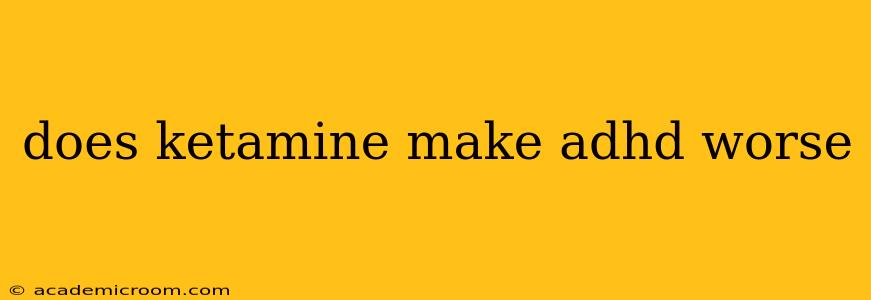Ketamine, a powerful anesthetic with growing use in treating depression and other mental health conditions, presents a complex picture when considered alongside ADHD (Attention Deficit Hyperactivity Disorder). While it's not typically used to treat ADHD, understanding its potential interactions is crucial for individuals with both conditions. The short answer is: it's complicated, and the effect depends on several factors. There's no simple yes or no answer.
How Does Ketamine Work?
Before delving into its potential impact on ADHD, let's briefly examine ketamine's mechanism of action. Ketamine primarily works by blocking NMDA receptors in the brain. This action affects various neurotransmitter systems, leading to its antidepressant and analgesic effects. Crucially, these neurotransmitter systems are also implicated in ADHD.
Can Ketamine Worsen ADHD Symptoms?
Some individuals report experiencing worsened ADHD symptoms after ketamine treatment. This isn't a universal experience, and the reasons are multifaceted. Possible contributing factors include:
-
Individual Variability: People respond differently to medications, and this is especially true with ketamine. Genetic predispositions, pre-existing conditions, and even the specific formulation of ketamine used can influence the outcome.
-
Disruption of Existing Medication Regimen: Ketamine can interact with other medications, including those commonly used to treat ADHD (stimulants, non-stimulants). These interactions can lead to unpredictable effects, potentially worsening ADHD symptoms or causing new side effects.
-
Temporary Cognitive Changes: Ketamine can induce temporary cognitive changes, including disorientation, confusion, and difficulty concentrating. These temporary effects might mimic or exacerbate existing ADHD symptoms.
-
Underlying Comorbidities: Many individuals with ADHD also have other mental health conditions like anxiety or depression. Ketamine's effect on these comorbidities can indirectly impact ADHD symptoms. For instance, improvement in depression might lead to improved focus, whereas exacerbation of anxiety could worsen inattention and hyperactivity.
Can Ketamine Improve ADHD Symptoms?
While not a primary treatment for ADHD, some anecdotal evidence suggests that in certain cases, ketamine might indirectly improve some ADHD symptoms. This is primarily because it addresses underlying conditions, such as depression or anxiety, that often co-occur with ADHD. When depression is successfully treated, some individuals report an improvement in their focus and concentration. However, this is not a consistent finding and shouldn't be seen as a replacement for ADHD-specific therapies.
Does Ketamine Interact with ADHD Medications?
Yes, ketamine can interact with ADHD medications. It's vital to discuss any current medication with a psychiatrist or other qualified healthcare professional before undergoing ketamine treatment. The potential for interactions necessitates careful monitoring and adjustment of medication dosages.
What Should I Do if I Have ADHD and Am Considering Ketamine Treatment?
If you have ADHD and are considering ketamine treatment for depression or another condition, it's absolutely crucial to:
- Discuss it with your psychiatrist: This is the most important step. Your psychiatrist can assess your individual situation, evaluate potential risks and benefits, and monitor you closely during and after treatment.
- Provide a complete medical history: This includes all medications, including those for ADHD.
- Be aware of potential side effects: Discuss potential side effects with your doctor and what to do if they occur.
Disclaimer: This information is for educational purposes only and does not constitute medical advice. Always consult with a qualified healthcare professional before considering any medication or treatment, including ketamine. They can provide personalized guidance based on your individual medical history and needs.
